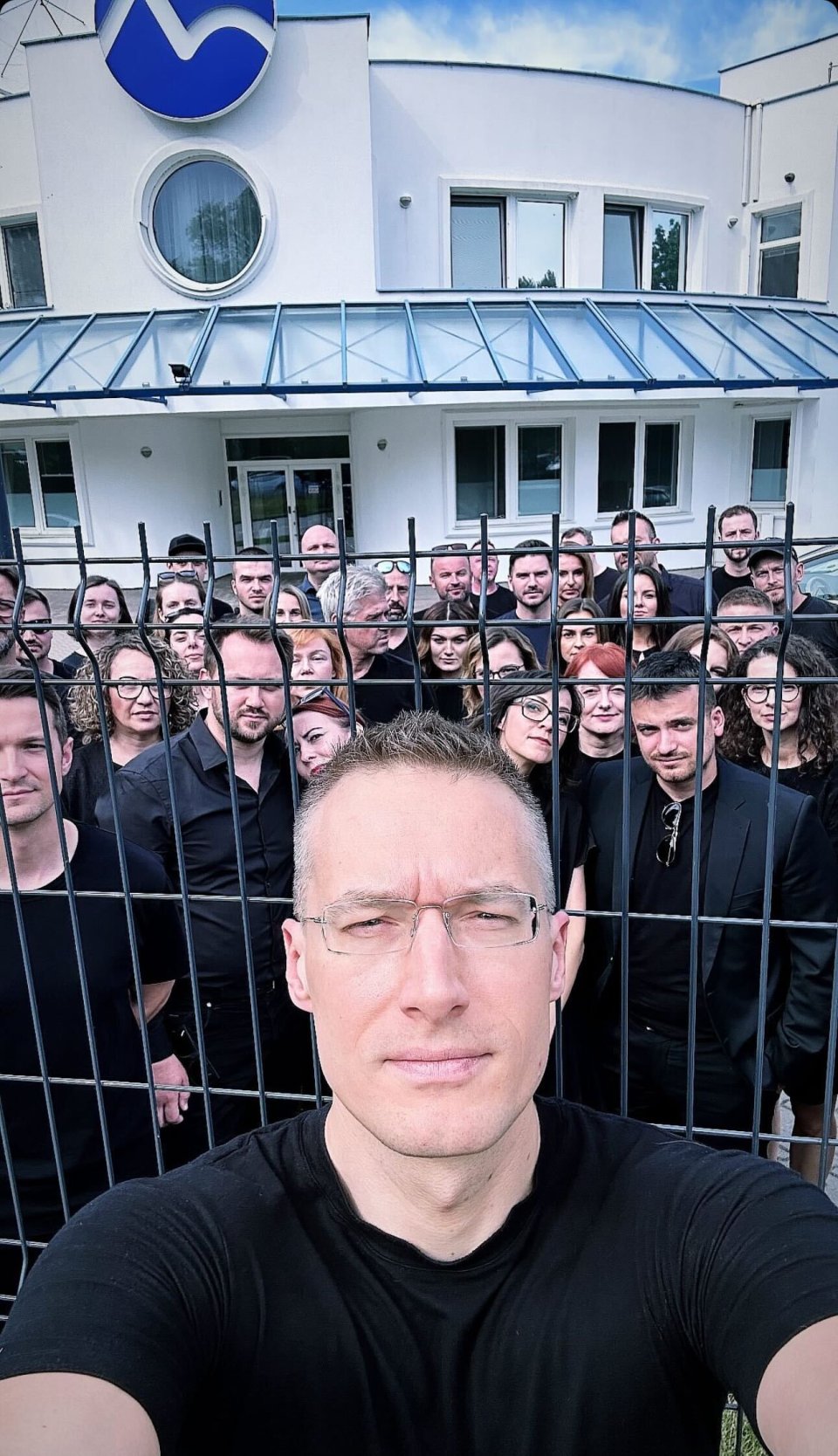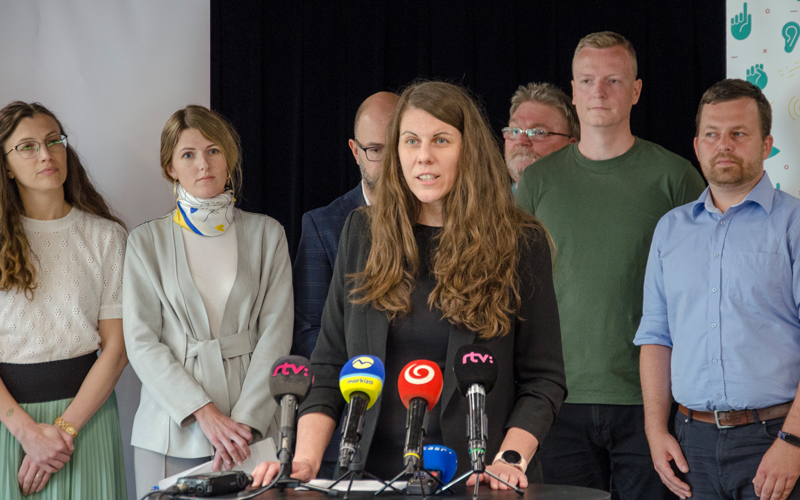Post-assassination Slovakia raises gloomy predictions (Zeitgeist 4.)
For a few days, there was hope that the horrible assassination attempt on Prime Minister Robert Fico might have led to a reconciliation of the polarized Slovak society. Although all political parties and civil society denounced violence, the reconciliation appeared to be a hopeful wish of civil society and opposition parties. The representatives of the ruling coalition immediately started a hateful campaign against the mainstream media, parliamentary opposition, and civil society organizations, blaming them for the assassination attempt. When there was an opportunity to change the rhetoric and slow down the populist agenda of the ruling coalition, the ruling coalition of SMER-SD, HLAS-SD, and SNS refused an invitation to the roundtable by President Čaputová and President-elect Pellegrini.
Instead of calming down the situation, the coalition doubled down the pace of controversial legislative changes. As a result, the bill which subordinates funding of independent art and culture to the political control of the Minister of Culture, a bill proposing the politicization of the public broadcaster, and a bill on „foreign support“was sent to second reading in the parliament.
Ongoing „orbanization“ of private broadcasting company
Attempts to suffocate broadcasters continue on more than one front. After taking political control over public broadcasting company RTVS, a creeping orbánification follows to private broadcasting. The ruling coalition politicians favor unregistered civic associations over established media with rigorous editorial standards. Even after taking office, culture Minister Martina Šimkovičová runs and appears on disinformation shows. Politicians are shunning established media and labeling them “hostile,” turning to these preferred platforms instead.
This trend is exemplified by the boycott of Markíza’s Na Telo political talk show, forcing it to revamp its format and shut down earlier than usual. Markíza journalists report internal pressures, such as pre-reviewing debate questions, to limit critical government coverage. TV Markíza’s future political programming is uncertain under new management. Political talk shows are crucial in Slovakia, with television being the primary news source for most, especially older voters. The government is also overhauling RTVS and replacing it with STVR, controlled by government appointees. Private channels like TV JOJ and TA3 are also losing key political debate shows and hosts.

The host of the political talk show “Na telo”, Michal Kovačič, with his colleagues from TV Markiza in black clothes in front of the TV building.
Photo: instagram.com/michal__kovacic
Independent culture under political control
Slovak parliament approved a controversial amendment regarding the Slovak Arts Fund (FPU), shifting decision-making from independent experts to a board influenced by the SNS-controlled Culture Ministry. The amendment, effective June 1, allows the board to consider expert commission advice, but it won’t be binding. The number of board members will increase from nine to 13, with seven appointed by Culture Minister Martina Šimkovičová.
FPU will now fund cultural facilities’ restoration, modernization, and infrastructure and support traditional folk culture. Many experts threatened to leave if the changes were approved, but the culture minister dismissed these concerns. The minister aims for the fund to support more regionally focused Slovak projects. Progresívne Slovensko, an opposition party, condemned the amendment as a move to destroy the public nature of FPU and asserted ministerial control.
The bill on political subordination of the public broadcasting company passed the first reading
Coalition MPs advanced to its second reading, a proposed law allowing minister to dissolve the independent public-service broadcaster RTVS and replace it with a state media outfit under their control. The Slovak Parliament moved to the second reading of a law to change the operations of public media, with 77 MPs in favor and 53 against. A prior extraordinary meeting was interrupted by an assassination attempt on Prime Minister Robert Fico, causing emotional and aggressive exchanges among MPs.
Opposition MPs criticized the law, arguing it aims to let the government, specifically the Ministry of Culture, control public media. RTVS employees responded with a strike alert, creating a strike committee due to concerns over the proposed changes. The government’s proposal conflicts with the newly adopted European Act on Media Freedom. It is supposed to oblige the EU member states to ensure the independent functioning of public media. The Slovak government’s proposal goes in precisely the opposite direction. The amendment may also conflict with freedom of expression and the right to information guaranteed by the EU Charter of Fundamental Rights.
Civil society organizations propose solutions to the dangerous bill on „foreign influence“.
Last month, the Slovak Parliament approved a proposal for amendments to the Non-Profit Organizations Act, Foundations Act, and Act on Non-Investment Funds, which was moved to the second reading. The bill allows for the cancellation of these organizations for additional reasons and mandates the disclosure of donors, contributors, and creditors. It introduces the label ‘organization with foreign support’ for NGOs receiving over 5,000 EUR from foreign sources or other labeled entities. This label must be used in all communications to increase funding transparency. Controversially, the bill may conflict with EU law. The Court of Justice of the European Union has ruled against similar labeling in the Hungarian Law on NGO transparency, questioning the bill’s compliance with the principles of freedom of association and EU legal standards.
This month, civil society organizations, including VIA IURIS, Zastavme korupciu, and Transparency International Slovakia, urged MPs to engage in a constructive discussion on the new NGO law amendment proposed by the SNS. Director Katka Batková highlighted concerns that parts of the proposed law could contradict constitutional freedom of association and EU fundamental rights. NGOs prepared alternative proposals to enhance NGO funding transparency without breaching constitutional principles. Positive aspects of the original proposals, like expanded reporting obligations and financial statement disclosures, were acknowledged. Proposed changes include reevaluating the authority to dissolve civic associations and labeling organizations receiving foreign donor support.

Katarína Batková, VIA IURIS director, during a press conference with representatives of other NGO’s .
Rulling coalition proposed limitations to the Freedom of Information Act
The SNS’s proposal to charge for accessing information raises concerns about transparency and accountability in government operations. This move to introduce fees for inquiries about state affairs is viewed as an assault on the right to access information, potentially fostering corruption. It suggests amending the law to allow the state to charge individuals seeking details about its activities. The proposal may limit individuals’ information rights, contradicting the principle that public information should be readily accessible without charge.
This change could complicate information access for journalists and organizations and raise fears of selective disclosure by authorities. The claim of potential information misuse lacks concrete examples in the proposal, leading to questions about transparency and fair access. Referring to the Czech model, the idea of fees for information access may not align with Slovak procedures, bringing forth concerns about democratic norms and decision-making autonomy. Concerns are raised about officials’ capacity to complicate journalists’ and organizations’ access to information due to spurious fees, potentially restricting transparency.
The chairman is dismissed, long sit the chairwoman
Questions arose regarding the process after the dismissal of the Chairman of the Council for the Judiciary, Ján Mazák, and the subsequent removal of two members elected by the parliament. The two members in question, former chairman Ján Mazák and Andrej Majerník, who were elected in 2020 with terms until 2025, faced arguments from the parliamentary majority. The grounds for their dismissal were cited as a lack of protection of judicial independence during the judicial reform of 2020. Although legally feasible under current legislation, this move drew criticism from the European Commission, CCJE, and the Slovak Constitutional Court for its potential impact on the Council for the Judiciary’s autonomy.
Judicial Council was not left without a lead for long. Marcela Kosová has been elected as the new Chairwoman of the Judicial Council, receiving 13 out of 15 votes in the election. Her quick election following the removal of the previous president is seen as a positive development for the judiciary. Her election marks the beginning of a new era for the council, with hopes of restoring trust in the Slovakian judiciary. However, there have been some controversial moments in Kosová’s past, including participation in events linked to conspiracy theories.
Public funding of civil society organizations goes under untransparent political control
The Ministry of Justice rejected addressing discrepancies in a decree that significantly alters the decision-making mechanism for human rights and freedom subsidies. A recent hearing at the Ministry of Justice of the Slovak Republic highlighted the strong opposition from various non-governmental organizations towards the proposed decree. The civil sector is concerned about the shift from an expert-assessed, transparent system to political decision-making without clarification.
Ministry of Justice refused to maintain transparency and professionalism in subsidy evaluation. With the failure to compromise during the recent proceedings at the Ministry of Justice, a proposed amendment to Decree No. 322/2016 will now advance with a “discrepancy” to the Minister of Justice. This move is part of the government coalition’s attempt to exert political influence over civil society, introducing changes like labeling organizations with foreign support. The Civil Platform for Democracy, backed by numerous NGOs and citizens, vows to utilize legal avenues to safeguard the civil sector’s independence amidst these developments.
About Zeitgeist
Zeitgeist is the English newsletter of VIA IURIS, in which we try to capture the zeitgeist of the political situation in Slovakia, which has changed dramatically after the parliamentary elections in September 2023.
The 4th government of Prime Minister Robert Fico was formed by a coalition of two, as they call themselves, social democratic parties – SMER-SD, HLAS-SD and the nationalist party SNS. Since the coalition was formed, institutions guaranteeing the rule of law and public control, including Slovak civil society, have been under constant attack.
Previous issues of our English newsletter can be found here
Topics: #RuleOfLaw #legislation #media #CivilSociety

